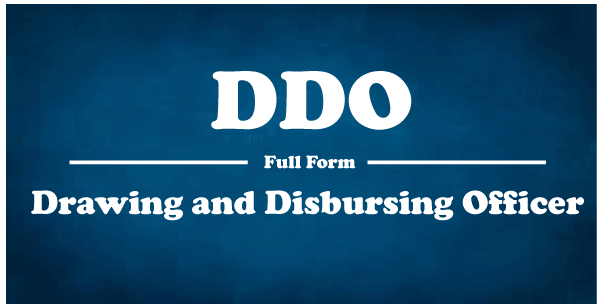What is the full form of DDODDO: Drawing and Disbursing OfficerDDO stands for Drawing and Disbursing Officer. DDOs serve as the senior members of the respective offices, usually known as gazetted officials. The Central Government of India has designated the DDO office as the head of the respective office, with primary responsibilities for drawing cheques and processing transactions on behalf of the government. A DDO is given this principal duty in accordance with Rule 2(xii) mentioned in 2005's General Financial Rules. 
Appointment of a DDOA DDO is chosen in accordance with the counsel of the head of the office, as per 1983 CGA (R&P) regulation 35. Any Gazette Officer working under the Office Head may be authorized to sign orders and bills on behalf of the Office Head. However, this does not in any way absolve the office head of their duty to verify the authenticity of the bill or the proper handling of funds after receiving payment. Types of DDOThe work done by persons holding the position of DDO is different in different offices. However, there are primarily three types of DDOs in operation. They are: Cheque Drawing DDOWorking as a cheque drawer, the Drawing and Disbursing Officer is supervised by a certain ministry or department. For instance, they are employed by the CPW or Forest departments in concerned offices. Contrary to the assignment account or letter of credit account, the cheque drawing DDO can withdraw funds depending on a certain payment type. Non-cheque Drawing DDOThe non-cheque Drawing and Disbursing Officer (DDO) is a departmental official who is not authorized to issue cheques. However, the bills are reportedly prepared by them and then delivered to the Public Accounts Officer, or PAO. When there is no Public Accounts Officer, those officers are typically given the power to draw cheques. Combined DDOInitiated in 1986, the combined Drawing and Disbursing Officer arrangement has more authority. Only secretariats of various ministries are qualified to apply for this position. The major responsibility for maintaining the GPF (General Provident Fund) of personnel is delegated to the combined DDO. Besides that, in terms of functionality, a PAO accountant is entrusted with the immediate responsibility of bill checking and is located in the cash division. Duties of Drawing & Disbursing officerThe central government's rules and guidelines must be followed by the DDO. A DDO is frequently expected to perform the following duties: Drafting legislationThe DDO's staff members construct the invoices using the records from paid salaries, contingencies, TA, and advanced payments, among other things. The Drawing and Disbursing Officer must sign the bill before it can be used. The DDO is in charge of creating distinct invoices based on several titles. He could, for example, create regulations for employees regarding payment, OTA expenses, etc. The total paid amount, the permissible amount, and other information must be provided in full for the attested bills. Serves as a bank for cashThe officer in charge of withdrawing money ensures that it comes from the book on the authorized circular. It is delivered to the recipient party as a cash payment or via a direct deposit to the recipient's account. The supplementary cash books, whose sheets are serially machine marked, include complete records of all cash transactions. The full name of DDO is also mentioned with the allowed transactions. The cash book's pages must be counted by the drawing and disbursing officers, who must also declare the page count on the first page of the book as a matter of record. Various obligationsThe duties of a DDO go beyond those listed above; these include checking revenue collection on a regular basis, controlling expenditure and cooperating with the Public Accounts Officer to reconcile the account. Additionally, the account book is also kept up to date. Types of payments that DDO starts/approvesSome of the several forms of payments that a Drawing & Disbursing Officer makes are described below:
The remaining payments, aside from these few, are sent to the Public Account Officers. Rules that the DDO must abide byThe DDO officeholder needs to complete several lengthy forms that take years to complete. Some of the essential rules that DDO must abide by are as below:
These are some guidelines that a Drawing and Disbursing Officer must adhere to in order to remain in their position. You can learn more about DDO's functions, different forms of DDO, and other associated data by reading this article. Nowadays, it is very common to see that every aspirant for government service aspires to get a coveted job as a DDO. But to retain the job, a gazetted officer must have prior expertise in the financial industry.
Next TopicFull Form
|
 For Videos Join Our Youtube Channel: Join Now
For Videos Join Our Youtube Channel: Join Now
Feedback
- Send your Feedback to [email protected]
Help Others, Please Share










